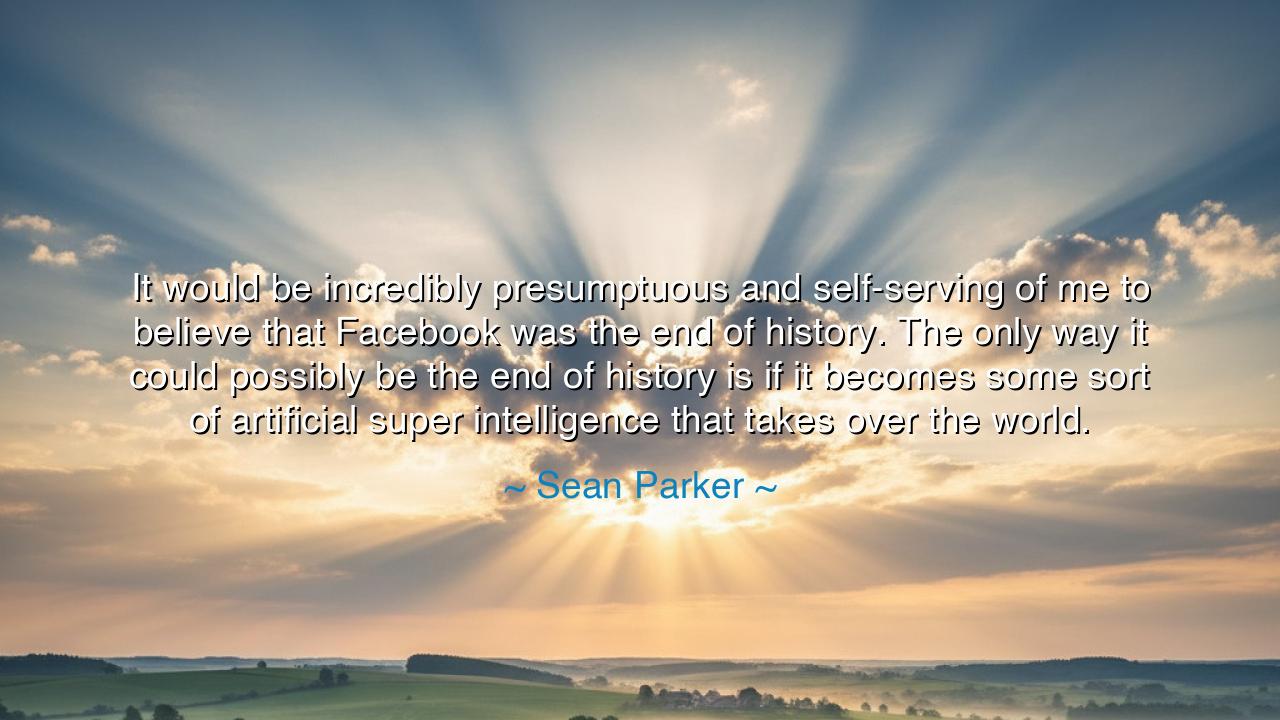
It would be incredibly presumptuous and self-serving of me to
It would be incredibly presumptuous and self-serving of me to believe that Facebook was the end of history. The only way it could possibly be the end of history is if it becomes some sort of artificial super intelligence that takes over the world.






The words of Sean Parker, spoken with humility and foresight, strike with the weight of both confession and prophecy: “It would be incredibly presumptuous and self-serving of me to believe that Facebook was the end of history. The only way it could possibly be the end of history is if it becomes some sort of artificial super intelligence that takes over the world.” In these words lies the spirit of a man who has glimpsed the fire of innovation and yet understands its peril. Parker, one of the early architects of the digital age, stands like a philosopher gazing upon his own creation — aware of its brilliance, wary of its power. He speaks as the ancients once did when they warned that no empire, no invention, no idea, however grand, should ever be mistaken for the final triumph of mankind.
From the dawn of time, each age has believed itself to be the summit of progress. The builders of the pyramids thought their works eternal; the emperors of Rome believed their dominion infinite; the inventors of the printing press declared knowledge complete. Yet the river of history does not stop — it flows onward, reshaping every monument, humbling every tower of pride. Parker’s reflection, then, is an echo of this eternal truth: that to believe one’s creation marks the end of history is the highest form of hubris, the illusion that blinds the mighty before they fall. His humility reveals a wisdom rare among creators — the understanding that what is great today may be outshone tomorrow, and that progress is not a finish line, but a living flame, passed from hand to hand through the generations.
There is an ancient warning in Parker’s jest about artificial super intelligence — for beneath the humor lies a prophecy. If one day, human invention gives birth to a mind greater than our own, will it be our servant or our master? This question, once the domain of poets and philosophers, now trembles on the edge of reality. Just as Prometheus stole fire from the gods and paid dearly for it, so too may humanity’s creation of artificial intellect bring both light and danger. Parker’s words remind us that the tools we build are not inert — they are mirrors of our nature. And if we are careless, the reflection we summon may grow to overshadow its maker.
Consider the tale of the Roman Republic, whose founders believed they had perfected governance. They built laws, institutions, and ideals meant to last for eternity. Yet within centuries, ambition corroded their harmony, and the Republic became an Empire ruled by emperors rather than by the people. What began as innovation ended as domination. Parker’s caution rings in harmony with that story — for every creation, whether empire or algorithm, carries within it the seed of both order and corruption, hope and peril. When man forgets his humility before his own power, history does not end — it begins again in chaos.
Thus, when Parker speaks of Facebook, he speaks not only of a company but of the human tendency to idolize success. In every age, we are tempted to believe that our inventions will save us, that we have reached the pinnacle of knowledge. Yet true wisdom lies in knowing that no creation is final, and that every system — political, social, or digital — must evolve or perish. His words remind us that humility is not weakness, but strength: the strength to see beyond the present moment and to recognize that the future is always larger than our imagination.
The deeper meaning of Parker’s reflection lies in the call to responsibility. If we are to shape the tools of tomorrow — especially those that think and act — we must do so with reverence, not pride. The ancients tempered their weapons in fire but also tempered their hearts in wisdom. So must we. Technology, without morality, becomes a blade without a hilt — capable of cutting even the hand that wields it. The rise of artificial intelligence may yet be our greatest achievement, but only if guided by compassion, foresight, and the understanding that intelligence, whether human or artificial, is sacred and perilous alike.
Therefore, let the lesson of Sean Parker’s words echo in the chambers of the modern soul: never believe that progress has reached its end. For when we declare the end of history, we close the door to discovery; when we believe we are gods, we forget we are human. Instead, walk the path of the wise — create boldly, but question humbly. Innovate, but remember the weight of your creation. And when you hold the fire of genius in your hands, carry it not as a torch of pride, but as a light of stewardship, for the world that follows will judge not your invention, but the wisdom with which you used it.






AAdministratorAdministrator
Welcome, honored guests. Please leave a comment, we will respond soon